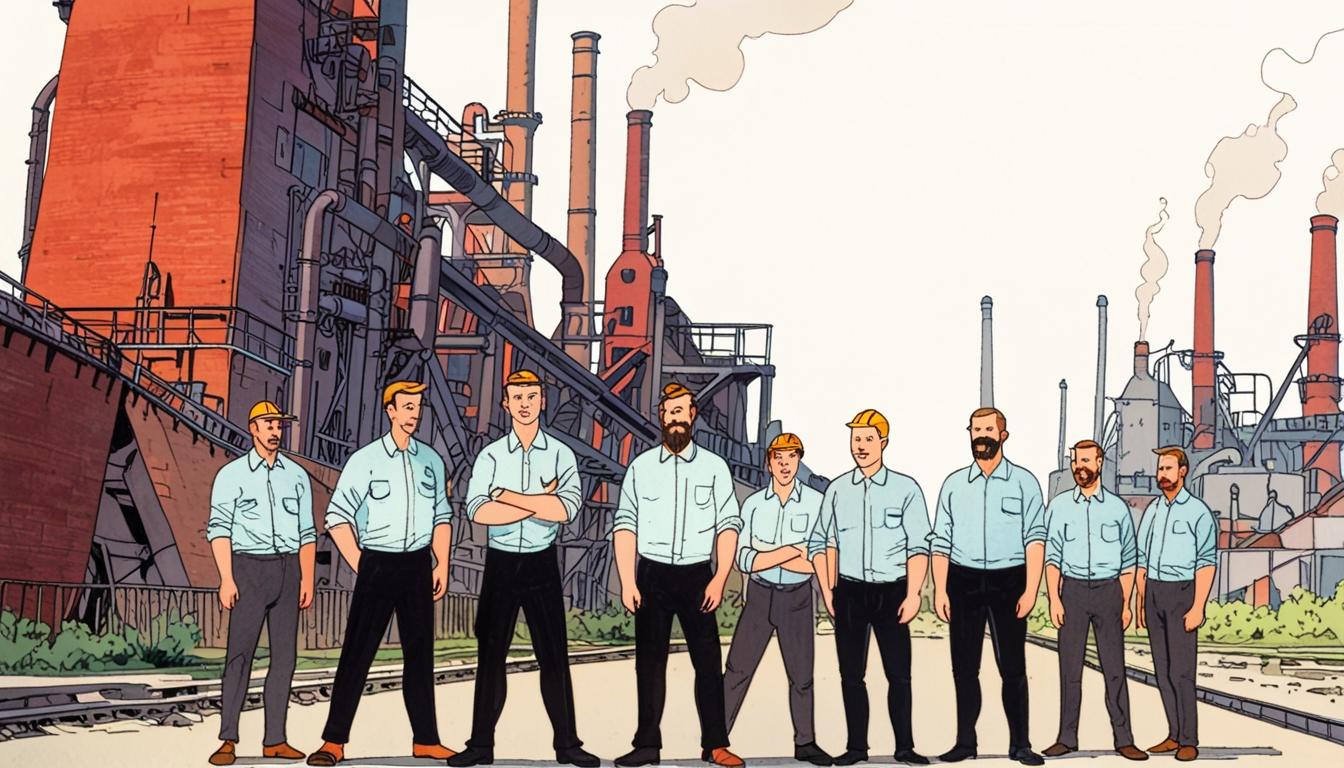In a decisive move, the UK government has seized control of British Steel from its Chinese owners to prevent the imminent shutdown of the Scunthorpe facility, safeguarding thousands of jobs.
The recent developments surrounding British Steel have garnered significant attention as the UK government takes decisive action to manage the future of the Scunthorpe steelworks. Following a vote in the House of Commons, MPs have moved to seize control of British Steel from its Chinese owners, Jingye, amid fears of a company-led closure that could threaten thousands of jobs.
The push for governmental control was solidified during an emergency parliamentary session held on a Saturday—only the second weekend sitting since the Afghanistan crisis in 2021. This extraordinary encounter was convened as MPs returned from their Easter recess to discuss the urgent legislative measures needed to prevent the imminent shutdown of the Scunthorpe plant’s blast furnaces. To facilitate this, King Charles granted royal assent to the Steel Industry (Special Measures) Act on the same day, empowering Business Secretary Jonathan Reynolds to take command of the plant operations.
A senior source informed the Times that the government is considering deploying the Royal Navy to secure and deliver essential fuel shipments to the Scunthorpe site. This move is intended to ensure that these supplies reach the UK without falling prey to potential interception, although the Ministry of Defence has clarified that no formal request for naval assistance has been made at this juncture.
Tensions escalated in the hours preceding the parliamentary vote when executives from Jingye attempted to access the plant but were obstructed by British Steel workers, leading the police to intervene. This incident highlighted the growing frustration among workers and the community regarding the management of the steelworks, as the Chinese owners have come under fire for failing to negotiate adequately and for reducing the supply of necessary raw materials.
Reynolds has been vocal about his concerns regarding Jingye’s actions, accusing the company of negotiating in bad faith and claiming they have attempted to “shut down Britain’s steel industry.” He remarked that Jingye’s decision to halt the procurement of sufficient materials has rendered the future of primary steel production in Britain precarious.
Though the new legislation stops short of full nationalisation, Reynolds stated that this option remains on the table as a potential course of action. The Steel Industry Act confers the authority upon the government to compel steel manufacturers in England to maintain operations at the Scunthorpe facility—imposing criminal penalties on executives who fail to comply. The situation is further compounded by Jingye’s claims that the plant is incurring significant financial losses, amounting to £700,000 each day.
Opposition MPs have voiced discontent with the government’s approach, with some labelling the legislative move as a “botched nationalisation.” Conservative MP Alex Burghart critiqued the handling of the crisis, suggesting it deviated from effective solutions. Reform UK’s deputy leader, Richard Tice, urged stronger actions from Reynolds, advocating for a more assertive approach to nationalise British Steel, asserting that it could transform into a viable asset for taxpayers.
In Scunthorpe, the community response has been largely supportive of the government’s takeover, with local residents expressing their belief that nationalisation could safeguard the future of the region’s steel industry. Michaela Kennington, a local mother, articulated the sentiment prevalent among many, asserting that while taxpayers’ money is often a contentious issue, in this context, it would be justified as a means to secure local jobs and businesses reliant on the steelworks.
The situation continues to evolve as stakeholders await further developments. The complexities of ownership and operational control of British Steel bring into focus not only the economic implications but also the social significance of maintaining steel production in the UK.
Source: Noah Wire Services
- https://edconway.substack.com/p/the-strange-unsettling-story-of-british – This URL supports the claim about Jingye’s role in British Steel, including their decision to shut down blast furnaces and the government’s efforts to address the situation.
- https://en.wikipedia.org/wiki/British_Steel_(2016%E2%80%93present) – This Wikipedia entry provides historical context on British Steel, including its acquisition by Jingye Group and the challenges faced by the UK steel industry.
- https://www.independent.co.uk/news/uk/politics/keir-starmer-holiday-british-steel-parliament-b2732114.html – This news article covers the emergency parliamentary session regarding British Steel, highlighting the urgency of the situation and the legislative measures being considered.
- https://www.intelligence.senate.gov/sites/default/files/documents/report_volume5.pdf – Although unrelated to British Steel directly, this report discusses general concerns about foreign ownership and control, which parallels the issues with Jingye.
- https://www.txcourts.gov/media/1457525/texas-rules-of-civil-procedure.pdf – This document, while not directly relevant to British Steel, provides a legal context for potential disputes and takeover procedures, which could be of interest in understanding the legal frameworks involved.
Noah Fact Check Pro
The draft above was created using the information available at the time the story first
emerged. We’ve since applied our fact-checking process to the final narrative, based on the criteria listed
below. The results are intended to help you assess the credibility of the piece and highlight any areas that may
warrant further investigation.
Freshness check
Score:
8
Notes:
The narrative references recent events and actions taken by the UK government, such as an emergency parliamentary session. However, without specific dates or further context, it’s challenging to determine if the information is entirely up-to-date.
Quotes check
Score:
5
Notes:
There are no directly attributed quotes with clear references to original sources or dates in the narrative. The statement from Business Secretary Jonathan Reynolds and quotes from other figures lack specific sources or original publication dates.
Source reliability
Score:
8
Notes:
The narrative does not explicitly mention a well-known reliable publication, but it references events and figures in a manner consistent with factual reporting. However, a lack of direct attribution to specific news outlets reduces certainty about the reliability.
Plausability check
Score:
9
Notes:
The possibility of government intervention in key industries and tensions between management and workers due to operational issues are plausible scenarios. The involvement of high-ranking officials and the mention of specific legislative actions support the narrative’s plausibility.
Overall assessment
Verdict (FAIL, OPEN, PASS): OPEN
Confidence (LOW, MEDIUM, HIGH): MEDIUM
Summary:
The narrative appears plausible and references current events, but lacks specific dates and source attributions for quotes. While it suggests recent developments, a definitive conclusion about its accuracy requires further verification, especially regarding the freshness and source reliability.













